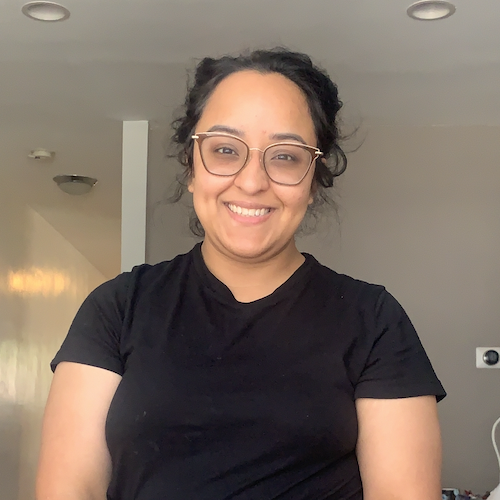Lupe Gomez grew up in Little Village, just east of Brighton Park among lots of extended family.. Her father was deported when she was quite young, making her aware of the importance of immigration status from an early age. Her mother and stepdad—who she calls “dad”—raised Lupe and her sisters. As an adult, she is now trying to help her stepdad apply for citizenship.
I remember the address. It was 2216 South Christiana in the Little Village neighborhood. It was a huge building. It had many apartments in it, and we were in apartment C. That’s where we lived. My cousins lived in apartment E, so we would always play together. We would walk or ride our bikes all the way to a corner store. We’d say, “Oh, let’s go to our corner store.” This is something that was comforting: my house and the corner store.
My stepdad worked in a body shop, right in the alley by our apartment; we could see the body shop from our window in the kitchen. Years later he started his own tow truck business. It was just him. So, I remember him rarely being home; it was mostly my sisters and my mom, and he was always working. He and my mom are not together anymore, but we keep in touch to this day. When I talk to him now, he’s retired, and he still always says, “tengo que buscar trabajo,” and I remind him, “Dad, you’re retired now. Do you know what that means? It means to relax.” I see the struggle in him, to now have had all of this time off after years of working. We go out for breakfast a few times a year to catch up. He’s been a resident since the late ‘90s and is now able to focus on becoming a citizen.
Now I live in a duplex in the Brighton Park neighborhood. My in-laws live on the second floor, and my husband and I live with our son on the first floor. Both Little Village and Brighton Park feel like home to me, especially because this is where we bought our first home, in Brighton Park. And we bought it specifically because I worked in Brighton Park, and I wanted to make sure that my son’s school was close to where I worked. That was just my priority. I needed to be close. I ended up working half a block away from his school.
I got involved in the Brighton Park Neighborhood Council in August 2021 through the parent mentor program. I was approached by somebody who recognized me from grammar school, a parent coordinator here with BPNC. She was like, “What are you doing this school year? We’re looking for parent mentors. Would you be interested?” I have an associate degree in Early Childhood so, to me, that was like, “Oh yes, this is what I need to do.”
I had left my job because of the pandemic, so I was like, “Yeah, let me put my foot in CPS.” So, you know, I could start building a name for myself there. So, that’s when I started getting involved with BPNC. A lot of people are understandably afraid to speak out because of their immigration status or the color of their skin. But I think BPNC does a good job of helping people feel that they can speak out. Seventy percent of the parent mentors are immigrants and they go on to get their GEDs and be teachers’ assistants, so there are building opportunities for all.
I felt it was important to join BPNC because my husband immigrated from Mexico when he was seven years old. His road to citizenship was fairly easy, which we have seen is not always the case. He did not have to leave the USA, which was our fear. In 2017 he became a citizen.
His mom is on the road to citizenship, and so are his stepdad and his sisters. So, I can’t help but say, “Do you see what you did? This is a chain. Because you took a step forward, now your family is.” This is what happens. Other people are seeing that it is possible, and other people are feeling that they can also do it. It just goes without saying that there is a need for support in our community. Whether it’s just between La Familia or an organization like BPNC.
